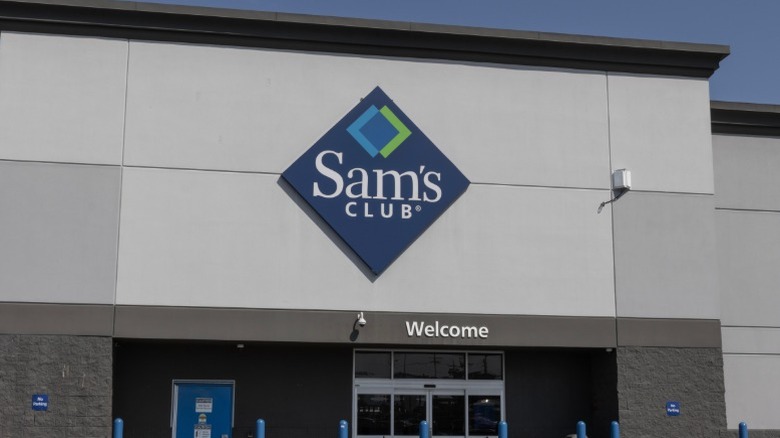
Yinyang/Getty
Customers shop at big-box wholesale clubs for a number of reasons, but one of the most important is to save money by buying more for less. The "Big Three" of these stores is Sam's Club, Costco, and BJ's, but navigating the murky waters of choosing the best (and cheapest) store can be challenging.
Each club has its perks and drawbacks. For example, there are a number of things that Sam's Club does better than Costco, including the quality of its Member's Mark products and shopping without ever going up to a register. On the flip side, there are aspects of the Costco experience that are always better than Sam's Club, like its in-store samples and its return policy. Add BJ's into the mix, and you have a lot of information to sort through. To help prospective customers out (or inspire you to switch to a different chain) we've gathered the "need-to-knows" about each club so you can make the most informed decision possible. (Note, pricing often depends on location and supply, so our comparisons are just one snapshot of a moment in time.)
Sam's Club wins out in membership prices

Jonathan Weiss/Shutterstock
Starting with the most obvious point, each club has a price of entry that comes in the form of a membership fee. Strictly based on the price, both tiers for a Sam's Club membership are cheaper than the corresponding levels at BJ's and Costco. Its most basic membership is called "Club" and costs $50 per year, while the most expensive "Plus" level costs $110 per year. Club members get benefits like savings and exclusive gas prices, but Plus members receive an additional 2% Sam's Cash back on purchases and additional savings at Sam's Club pharmacies and eye care. Sam's Club offers a generous 60% discount on memberships for certain groups, including military and students, who can get a Club membership for only $20 per year (sometimes even low as $15 depending on limited-time offers).
At BJ's the two equivalent membership levels are called "The Club Card" and "The Club+ Card," which cost $60 per year and $120 per year, respectively. These options carry similar benefits as the ones at Sam's Club, but one distinct perk for Club+ members is same-day delivery on orders over $50. Costco recently raised its membership prices, which come in at $65 per year for its "Gold Star" membership, and $130 per year for its "Executive" membership. One cool perk if you can afford Costco's Executive membership is that you'll get a monthly $10 credit for its online store or to use on Instacart. Additionally, Executive members get their own unique shopping hours.
Sam's Club and BJ's have cheaper staples

Isabel Pavia/Getty
There are certain grocery store staples that almost everyone buys, including coffee, milk, flour, and bread. And if something is a staple in your pantry or fridge, it's important to know you're getting it for the cheapest price. So, we conducted our own review of a few of these items to help determine which store gets you the most bang for your buck.
To start, all purpose flour looks to be cheapest at Sam's Club, as its Member's Mark brand sells a 25-pound bag of all-purpose flour for around $8. BJ's generic brand, Wellsley Farms, doesn't offer all-purpose flour, and a smaller bag of Gold Medal brand will cost you just under $8. Costco's Kirkland Signature brand sells all purpose flour but for much more; $20 will get you two 10-pound bags.
For more direct comparisons, we looked at coffee prices (which might skyrocket in 2025), chicken breast, and eggs. All three carry Starbucks Pike Place Roast ground coffee. At Sam's Club and BJ's, a 40-ounce bag costs $20.98 and $20.99, respectively. Costco sells a smaller and more expensive bag, so Sam's Club wins the value race. Additionally, the chains' brands all carry a version of boneless skinless chicken breast, with the cheapest option being BJ's Wellsley Farms, which goes for $2.29 per pound. Two-dozen eggs will cost shoppers the least at Sam's Club, where they go for $5.42, versus $8.99 at BJ's and $6 at Costco.
Household items are less expensive at BJ's and Sam's Club too

ChicagoPhotographer/Shutterstock
As wholesale clubs, Costco, BJ's, and Sam's Club sell household goods alongside foodstuffs. All three chains' generic brands offer essential paper products, so which will win out as the cheapest? At Sam's Club, Member's Mark select and tear paper towels run customers $20.93 for 15 rolls. BJ's Berkley Jensen brand offers 12 select-a-size rolls at only $16.99. Finally, Costco's Kirkland paper towels are $23.99 for 12 rolls.
Since each brand offers different sizes, it makes more sense to look at how much money you'll spend per square foot. Looking at this metric, although BJ's is the cheapest, you'll get more bang for your buck at Sam's Club — 49.26 square feet of roll per $1 spent, versus 46.19 square feet per $1 at BJ's, and 42.77 square feet per $1 at Costco.
Toilet paper is another household staple. At Sam's Club, Member's Mark 2-ply toilet paper costs $24.58 for 45 rolls. Berkley Jensen at BJ's offers 30 2-ply rolls for $16.99. Finally, Costco's Kirkland Signature brand sells 30 2-ply rolls for $24.99. It's clear that Costco is the most expensive option, but again, deciding which is the least requires some math. At Sam's club, you'll get 51.02 square feet of toilet paper per $1, 57.02 square feet per dollar at Costco, and 72.68 square feet per dollar at BJ's, which clearly comes out on top.
To coupon, or not to coupon

Drazen Zigic/Getty
While BJ's might not always have the best prices, it's the only chain that allows customers to use coupons. BJ's accepts both its own coupons and those issued by the manufacturer (plus a few restrictions). Customers can use one BJ's coupon paired with one manufacturer coupon on an item, but the value of these coupons cannot be more than the item originally costs. You can stack coupons, but not so much that the item becomes free. You can use paper and digital coupons, and BJ's members can load coupons directly to membership cards.
Aldi doesn't accept manufacturer's coupons, and neither does Costco and Sam's Club. Costco's FAQ states that it won't take coupons because it "distribute[s] our own offers and savings to our members" According to its cost calculator, customers would have to spend $540 to $543 in the "Household Essentials" category alone (groceries, pantry goods, etc.) to earn 2% back equal the membership fee. Similarly, Sam's Club says that its "Instant Savings" program is more convenient, and it will not take coupons. Yet, to earn the maximum $500 via its 2% Sam's Cash back program, customers would need to spend $25,000 in a year.
While one store doesn't win out in every category, it seems that Sam's Club largely comes out on top. It flaunts the cheapest membership price, and alongside less expensive household items and pantry staples, Sam's offers customers the overall best value.



